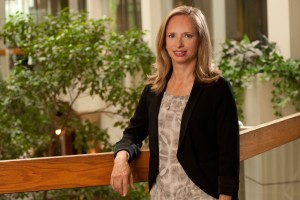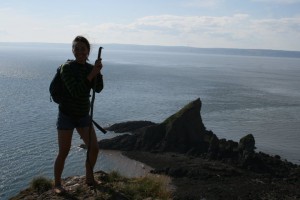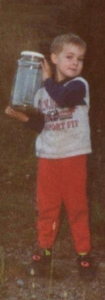Meet the team! Below we introduce the members of the YAWP team, and elaborate upon the intersections between their personal interests and the research they will pursue.
 Andrea (Davis) Johnston – Hello everyone and welcome to our site. Like some of my team mates, I will be completing my Bachelor of Arts with a major in Literature once this course is complete. I am studying Literature (with a minor in Psychology) because of a pure love of learning about human nature and communication (no career change for me upon graduation). This class has revealed the intersections between literature and orality and exposed me to authors such as Thomas King and Harry Robinson who are using traditional European settler written narratives in English to expose broad audiences to First Nations oral storytelling narratives.
Andrea (Davis) Johnston – Hello everyone and welcome to our site. Like some of my team mates, I will be completing my Bachelor of Arts with a major in Literature once this course is complete. I am studying Literature (with a minor in Psychology) because of a pure love of learning about human nature and communication (no career change for me upon graduation). This class has revealed the intersections between literature and orality and exposed me to authors such as Thomas King and Harry Robinson who are using traditional European settler written narratives in English to expose broad audiences to First Nations oral storytelling narratives.
Susan Gingell’s Negotiating Sound Identities in Canadian Literature has relevance and interest for me in a very different way than it does for my team mates. I work in a global company in a strategic role that requires me to find and create intersections across groups, and discover the best in everybody to advance the company’s vision. My boss and our head office are French in Paris, France. Our research and development team is in Brisbane, Australia. We have critical team members in Russia, Chile, Brazil, South Africa (Afrikaans), Kazakhstan, India and several other English speaking countries. Most of our communication is by teleconference. I spend my days navigating accents, phrases, cultural nuances and the biases, exclusions and assumptions that come with the oral differences. I look forward to exploring “the complexities of identity and subjectivity in a globalized world” (Gingell 130) in our Conference with my team and others in the course.

Brendan Ha — Hey, my name is Brendan! I’m a second generation Korean who lives in Abbotsford. A rural town, it is apt described as “overgrown nothing” or in colloquial terms: Stabbotsford. Currently, I’m at the cusp of graduation after a long five years. I am an English Literature major who hopes to walk the stage without fuss in May before being pulled by UBC’s academic gravity for the next year in order to complete a Bachelor of Education. I want to teach secondary students English, but I have a feeling that I’ll end up teaching Japanese at my former high school. Who knows?
After being plunged into the wonderful world of Canadian Literature, I became very fond of Indigenous oral traditions. Having studied Beowulf earlier in the semester, I’ve become immensely curious about the peculiarities of oration. Orated stories have the power to remain in the social conscience, and with such a communal remembrance comes a special, inherited canonization that we often fail to consider. Through the ancient force of memory, stories have the potential to become immortal. And yes, I believe the implication that stories are in fact, living things. Much like a language that shifts and transforms with new accents, colourful cadences and meanings, orated stories have the ability to encompass the human experience with the intimacy of sound. When confronted with the issue we may ask ourselves, what is Canadian literature? Perhaps, through the mutual acknowledgement of both written and orated spheres we can provide a fuller, more inclusive Canadian canon.

Merriam Alicia — Hi everyone! My name is Merriam, and I am in my final semester of my undergraduate degree, a Bachelor of Arts in Human Geography. That being said, I find my research interests skewing more towards the intersections between history, anthropology, and gender studies. This class has allowed for the opportunity to contemplate these areas within the arena of Canadian Literature, and I can’t count the times I’ve learned something new in this class about Canada, about which I assumed I knew all I needed to know. That assumption has been checked, and I look forward to adding to my knowledge, both through this collaboration and beyond. I find the idea of sound and identity that is central to our chosen intervention (based on Gingell’s idea of sound identities) fascinating, and certainly an important one when considering the future of Canadian Literature.

Nicholas Wilson — Hello everybody, welcome to our conference site! My name is Nick, and I am also in my final semester of my undergrad, finishing with a Bachelor of Music with a Major in English Literature. I am very interested in becoming an educator, and am planning to take my practicum next year and become a music and English teacher. I grew up in Sunshine Valley BC, a very small community near Manning Park, and attended school in Hope. I had the great opportunity to be raised within a community steeped with indigenous culture, which allowed me to understand and gain knowledge about the people around me, and where my place was amongst them. Ultimately, what I learned was that we are all human beings, all worthy of having equally significant voices, all capable of working together for the better of humanity, and of the Earth. From the perspective of a musician and English major, Gingell’s intervention “Negotiating Sound Identities in Canadian Literature” presents a deeply fascinating and enriching circumstance to investigate the significance of oral and aural representations of Indigenous culture within both literature and music; the link between written and spoken arts are inseparable, as both contain cultural aspects indicative of “the formulation of identity and the development of a sense of place and social context” (Gingell, 127). By analyzing both music and written art that maintain the sound identity within Indigenous cultures and communities, I hope to gain a deeper understanding in Indigenous culture and ultimately to gain more humanity, by reading and listening to the stories of the people, and determining the beautiful aspect of ‘sound identity’ which allows for such beautiful human interaction and understanding.

Simon Sierra — Hi everybody and welcome to our blog! My name is Simon, and I am in the third of what should be five years at UBC, currently pursuing a Bachelor of Arts in English Honours and Creative Writing. Working in these two departments, I have been able to learn about and share my own stories in various forms so I was really excited to find myself working on the topic of sound identity and orality with this group.
Storytelling is more than an art form; as we have seen so far in this semester, stories are intimately woven into the fabric of one’s identity. I am very much looking forward to seeing how the aural and oral aspects of storytelling as a tradition and a means to establish identity have played out in Indigenous and Canadian literature. From the perspective of my English degree, I hope to understand about the cultural implications at work in any given text, and how authorial agency is sometimes limited or appropriated by the forces of the dominant culture. From the perspective of my Creative Writing degree, I want to learn more about how stories have an effect beyond the page and how the speaking aloud and sharing of stories can elevate art into identity. I’m excited to get to work on this and look forward to not only learning about the issues at the heart of this subject, but at what you might all have to say in our dialogues as well!
